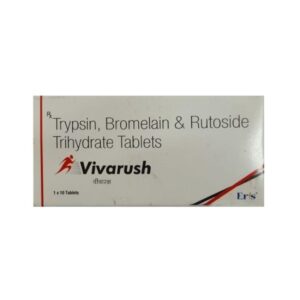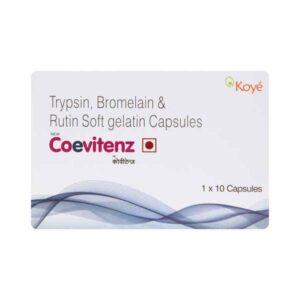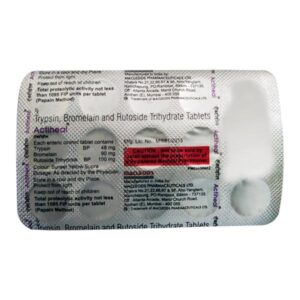RUTIN + TRYPSIN + BROMELAIN
Rutin: Rutin is a bioflavonoid that is derived from various plants such as buckwheat, citrus fruits, and apple peels. It is commonly used as a dietary supplement and is also found in certain medications.
Rutin has several potential therapeutic uses. It is known for its antioxidant and anti-inflammatory properties, which play a role in protecting the body against oxidative stress and reducing inflammation. It is also believed to strengthen blood vessels and improve circulation, making it beneficial for conditions such as varicose veins and hemorrhoids. Additionally, rutin has been studied for its potential anti-cancer, anti-diabetic, and neuroprotective effects.
The mechanism of action of rutin involves its ability to scavenge free radicals and reduce oxidative stress. It also inhibits the activity of certain enzymes involved in inflammation.
The appropriate dose of rutin depends on the specific condition being treated. However, typical dosages range between 200 and 500 mg per day. It is important to follow the instructions provided on the product packaging or consult a healthcare professional for individualized dosing recommendations.
Rutin is generally considered safe for most individuals when taken at recommended doses. However, like any medication or supplement, it can cause side effects in some cases. Common side effects may include stomach upset, diarrhea, headache, and allergic reactions such as rash or itching. In rare instances, high doses of rutin may lead to liver toxicity.
It is important to note that rutin may interact with certain medications, such as blood thinners like warfarin or aspirin, increasing the risk of bleeding. It is advisable to consult a healthcare professional before starting rutin, especially if you have any pre-existing medical conditions or are taking other medications.
Trypsin: Trypsin is an enzyme medication derived from porcine pancreas. It is used for various medical conditions, primarily those involving tissue inflammation and digestion.
Trypsin works by breaking down proteins into smaller peptides and amino acids. It mimics the action of the naturally occurring enzyme trypsin, assisting in the digestion of protein and reducing inflammation in the body.
In medical practice, trypsin is typically administered topically in the form of ointments or creams to treat wounds, ulcers, surgical incisions, and burns. It helps remove dead tissue and promote healing by increasing the turnover of damaged or necrotic tissue.
The dosage of trypsin varies depending on the specific condition being treated, the severity of the case, and the formulation of the medication. It is important to follow the prescribed dosage and instructions provided by a healthcare professional.
While trypsin is generally well-tolerated, it may cause some side effects. Common side effects may include skin irritation, redness, itching, and allergic reactions. In rare cases, trypsin can cause more severe allergic reactions such as difficulty breathing, swelling of the face or throat, or rash. If any of these symptoms occur, immediate medical attention should be sought.
It is important to note that trypsin is derived from pigs, so individuals with known hypersensitivity to porcine products should avoid using medications containing trypsin.
It is always recommended to consult a healthcare professional before using any medication to ensure its suitability for the specific condition and individual patient.
Bromelain: Bromelain is a natural enzyme extract derived from pineapples. It is commonly used as a dietary supplement and has been used for its potential health benefits.
Bromelain’s mechanism of action is primarily attributed to its proteolytic activity, meaning it can break down proteins. It is thought to have anti-inflammatory, analgesic, and immune-modulating properties.
Bromelain is used for various purposes, including reducing inflammation and swelling, improving digestion, and aiding in the management of conditions such as arthritis, sinusitis, and indigestion. It is also used in some topical formulations for wound healing and to help remove dead tissue from burns.
The dose of bromelain varies depending on the specific condition being treated. It is typically recommended to follow the instructions on the product labeling or consult a healthcare professional for guidance.
Some potential side effects of bromelain include gastrointestinal issues like nausea, vomiting, and diarrhea. Rarely, it may cause an allergic reaction in individuals sensitive to pineapples or other bromelain-containing products. High doses or long-term use of bromelain may also have a mild blood-thinning effect and should be used with caution in individuals taking antiplatelet or anticoagulant medications.
It is important to note that bromelain is considered a dietary supplement rather than a regulated medication. Therefore, the quality, purity, and safety of different brands or sources of bromelain may vary. It is advisable to choose reputable brands and consult with a healthcare professional before starting any new dietary supplement regimen.



